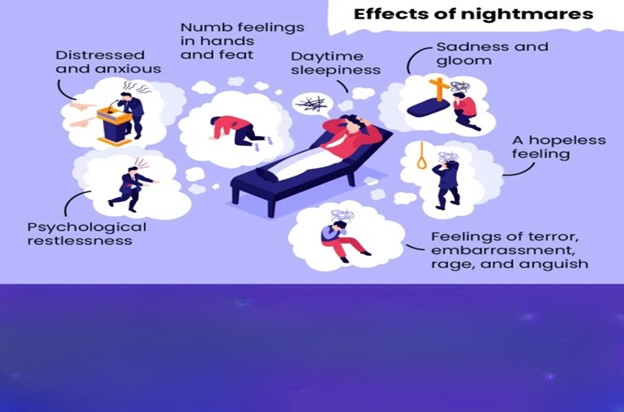Nightmares are distressing or upsetting dreams. The American Academy of Sleep Medicine reports that more than 50% of adults occasionally experience nightmares. However, some people have frequent nightmares. A recurring nightmare is a so-called nightmare. Recurring nightmares are more common in children than in adults.
Not every night’s reoccurring nightmares are the same. Although the content of many nightmares can vary, they frequently share themes and motifs. Regardless, you frequently experience comparable feelings after waking from these nightmares, such as:
• Anger
• Sadness
• Guilt
• Anxiety
It may be difficult to fall asleep again as a result of these thoughts and feelings.
Frequently, there is a deeper reason for recurrent nightmares. In this post, we’ll look at some of the typical underlying issues that lead to recurrent nightmares as well as possible treatments.
Even though they may seem similar, nightmares and night terrors are very different experiences. Nightmares are frightening, vivid nightmares that typically wake the person up right away. These dreams are frequently simple to recall.
It is challenging to awaken from night terrors. Extreme agitation could result in a person writhing around, yelling, or even sleepwalking. People who experience night terrors typically sleep through them despite these physical symptoms.
Nightmares and night terrors occur at various points throughout sleep. You normally go through four stages of sleep before you start to nod off. You are in a light sleep during phases one and two. You enter a deeper state of sleep in stages three and four.
You enter rapid eye movement (REM) sleep, which is frequently referred to as the fifth stage of sleep, roughly every 90 minutes. Night terrors typically occur during non-REM sleep, whereas nightmares take place during REM sleep.
In many instances, treating the underlying illness is necessary in order to treat recurrent nightmares.
Depression and Anxiety
The emotions and feelings that might be causing your nightmares can be resolved by treating illnesses like depression and anxiety. The following are a few possible treatments for these conditions:
• Counseling, particularly cognitive behavioral therapy (CBT)
• Support groups for drugs like SSRIs (selective serotonin reuptake inhibitors).
• Practices for relaxation include yoga, meditation, and deep breathing
• Routine exercise
Sleep Conditions
Narcolepsy and sleep apnea may each require a unique approach to treatment. Breathing devices, medicines, dietary changes, and occasionally even surgery are used to treat sleep apnea.
Most frequently, long-term drugs like stimulants and certain antidepressants are used to treat narcolepsy.
PTSD
It’s crucial to get expert help if PTSD is the root cause of your nightmares. PTSD nightmares can be treated with particular therapies like imagery rehearsal therapy and visual-kinesthetic dissociation.
Recalling the nightmare (or nightmares) when awake and altering the ending to make the dream less terrifying are both part of imagery rehearsal therapy. Another method to help transform unpleasant memories into new, less traumatic memories is visual-kinesthetic dissociation treatment.
Cognitive behavior therapy (CBT) can be used to treat PTSD-related nightmares in addition to anxiety and depression.
In one recent study, researchers looked into whether CBT for PTSD could assist with reoccurring nightmares brought on by trauma. CBT was given to research participants for 20 weeks. The study’s findings showed that 77% of participants had stopped having recurrent PTSD-related nightmares following 20 weeks of CBT.
Medication may be used to treat PTSD-related nightmares as part of a comprehensive therapy plan. However, medication is rarely used to treat recurrent nightmares in conditions other than PTSD.
Lifestyle Changes
Making improvements to your bedtime routine can help you develop healthy sleeping patterns, which can help you stop having frequent nightmares.
Plan your sleep schedule. You may ensure that you receive enough sleep throughout the night by following a sleep regimen. If you have frequent nightmares brought on by stress or worry, it might also offer some routine steadiness.
Put your electronics away. Making ensuring your body is prepared for sleep is a significant aspect of achieving better sleep. The sleep hormone melatonin is known to be suppressed by the blue light from devices, making it more difficult to get to sleep and stay asleep.
Don’t use stimulants. Before night, using stimulants can make it more challenging to fall asleep. The National Sleep Foundation claims that caffeine, alcohol, and tobacco all have a deleterious impact on sleep.
Create the scene. The comfort of your bed, pillows, and blankets should be considered. Additionally, furnishing your bedroom with cozy, familiar items might support creating a secure environment for sleeping.
If you frequently have nightmares, it could be difficult for you to go back to sleep. Here are some techniques you might employ to relax once you wake up from a nightmare.
Breathe deeply by practicing. Deep breathing, also known as diaphragmatic breathing, can assist to drop your blood pressure and slow your heart rate if you wake up startled or anxious.
Talk about the dream. Talking about the dream with a spouse or friend can occasionally assist to reduce some of the worry it may have induced. It might also be a useful technique to acknowledge that it is nothing more than a dream.
Write the dream again. Rewriting your thoughts and feelings is a component of CBT. You might be able to get back to sleep if you can change the nightmare into something less ominous or unsettling.
A deeper issue usually exists behind recurring dreams. This cause may be related to stress, anxiety, drug use, or even substance abuse.
If you think your frequent nightmares are affecting your quality of life, talk to your doctor or mental health professional. Recurring nightmares may be reduced or eliminated after addressing the underlying problem. If you’re looking for a “Online counsellor,” contact TalktoAngel, a service that connects the best online therapists with “Counselling online.”
